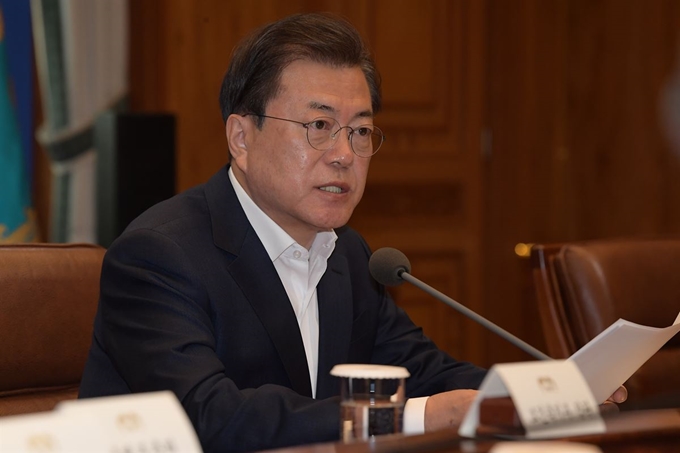
It is urgent to push for structural reform
구조 개혁 추진이 시급하다
Major economic data shows that the Korean economy is feeling the impact of the coronavirus pandemic. Industrial output, investment and consumption have just begun a downward spiral with business sentiment falling to an 11-year low. Yet this comes as no surprise considering the scope and severity of the economic fallout from the public health crisis.
주요 경제지표는 한국 경제가 신종 코로나 바이러스 대유행의 영향을 느끼고 있다는 것을 보여준다. 산업 생산, 투자 및 소비 모두 하락하기 시작했고 기업 경기심리도 11년래 최저치로 떨어졌다. 그러나 이런 현상은 공중보건 위기의 경제적 여파의 범위와 심각성을 고려할 때 놀라운 일은 아니다.
According to Statistics Korea, industrial output shrank by 3.5 percent in February from a month earlier, marking the steepest fall since February 2011. Facility investment also plunged by 4.8 percent, while consumption tumbled 6 percent. All these point to a deteriorating economic situation.
통계청에 따르면, 산업 생산은 2월 전월 대비 3.5% 감소해 2011년 2월 이후 가장 큰 폭으로 하락했다. 설비 투자 또한 4.8% 급감했고, 소비는 6% 폭락했다. 이 모든 수치는 악화일로의 경제 상황을 적시하고 있다.
More seriously, the country may face economic woes unparalleled by any previous calamities such as the 1997-98 Asian financial turmoil and the 2008 global financial crisis. No country is more painfully affected by the virus-triggered catastrophe than South Korea -- a small-scale, open economy which has heavily relied on foreign trade for economic growth.
더 심각한 것은, 한국이 1997-98년 아시아 금융위기와 2008년 세계 금융위기와 같은 이전의 재앙에 비할 바 없는 경제 위기에 직면할 수도 있다는 것이다. 경제 성장을 위해 대외 무역에 과도하게 의존해 온 소규모 개방 경제의 한국보다 바이러스로 촉발된 재앙으로 더 고통을 받는 국가는 없다.
If there is any consolation, the country's exports decreased a mere 0.2 percent last month from a year before. The Ministry of Trade, Industry and Energy said that outbound shipments totaled $46.9 billion in March, compared with the $47 billion posted in the same month of 2019.
위로가 될 만한 것이 있다면, 한국의 수출이 지난달 전년 동월 대비 미미하게 0.2% 감소했다는 것이다. 산업통상자원부에 따르면 3월 수출은 전년 동월의 470억 달러에 비해 소폭 하락한 469억 달러에 달했다.
However, industry watchers predict exports will fall considerably this month when the country bears the brunt of the disruption of global supply chains caused by lockdowns and isolations. It will be inevitable for Korea to see a sharp decline in its overseas shipments as major trading partners, including China, the U.S. and Europe, are undergoing the ripple effects of economic contagion.
그러나 업계 전문가들은 봉쇄와 격리 조치로 인한 글로벌 공급망 붕괴의 타격을 받는 이번 달 수출이 크게 감소할 것이라고 예측하고 있다. 중국, 미국 및 유럽과 같은 주요 교역 상대국이 경제전염의 파급 효과를 겪고 있어 한국의 수출이 급감하는 것은 불가피할 것이다.
As things stand now, the country faces a much gloomier growth outlook. According to the Bank of Korea, the business sentiment index (BSI) for manufacturing nosedived to 54 for April from 69 for last month. The index, a barometer of future business prospects, reading is the lowest since March 2009. The BSI for exports fell 16 points to 66 and that for domestic sales was also 15 points lower at 60.
현재의 상태로 볼 때 한국은 훨씬 더 암울한 성장 전망에 직면해 있다. 한국은행에 따르면, 제조업 기업경기실사지수(BSI)는 지난달 69에서 이번 달 54로 급락했다. 미래 경기 전망의 지표인 이 지수는 2009년 3월 이래 최저치다. 수출 경기실사지수는 16포인트 하락한 66, 내수 판매 지수는 15포인트 하락한 60을 기록하고 있다.
There is no need to mention such dismal figures. Airlines, travel agencies, hotels, restaurants and retail stores have already been experiencing difficulties due to the spared of COVID-19. The manufacturing sector is no exception. The production of automobiles plummeted by 27.8 percent in February. Other key industries such as steel, shipbuilding and petrochemicals also suffered setbacks.
이런 암울한 수치는 언급할 필요도 없다. 항공사, 여행사, 호텔, 음식점 및 소매점들은 코로나19의 확산으로 이미 어려움을 겪고 있다. 제조업도 예외는 아니다. 자동차 생산은 2월 27.8% 급락했다. 철강, 조선 및 석유화학 같은 다른 주요 산업들 또한 좌절을 겪었다.
Against this backdrop, the Moon Jae-in administration came up with a 100-trillion-won ($80-billion) economic rescue package last week to help hard-hit businesses, particularly small and medium firms, stabilize people's livelihoods and boost consumption. The central bank also announced a plan to supply “unlimited” liquidity to the market to prevent a credit crunch arising from the epidemic.
이런 상황에서, 문재인 정부는 지난주 타격을 받고 있는 기업, 특히 중소기업 지원과 민생 안정 및 소비 진작을 위해 100조원(800억 달러) 규모의 경제 구제 방안을 발표했다. 중앙은행도 감염병으로 인한 신용 경색을 막기 위해 시장에 ‘무제한’ 유동성을 공급할 계획을 발표했다.
The massive fiscal and momentary support programs are crucial in keeping businesses afloat and preventing the economy from collapsing. But this “helicopter money” will not automatically guarantee economic resuscitation. The economy cannot survive the coronavirus tsunami if it fails to regain its competitiveness and growth momentum.
이런 대규모 재정 및 통화 지원 계획은 기업의 도산과 경제 붕괴를 막는 데 중요하다. 그러나 막대한 돈의 살포를 의미하는 ‘헬리콥터 머니’ 정책이 자동적으로 경제 회생을 보장하는 것은 아니다. 경쟁력과 성장동력을 회복하지 못하면 한국 경제는 코로나 바이러스 쓰나미에서 살아남을 수 없다.
Even before the viral outbreak, the country was going through a prolonged economic slump. So the Moon administration should take the pandemic as an opportunity to push for structural reform. It also must promote deregulation and innovation.
바이러스가 발생하기 전부터 한국은 장기 경제 침체를 겪어오고 있었다. 따라서 문재인 정부는 이 감염병 대유행 사태를 구조 개혁을 추진할 기회로 활용해야 한다. 또한 규제 완화와 혁신도 촉진해야 한다.
코리아타임스 논설위원실
기사 URL이 복사되었습니다.

댓글0